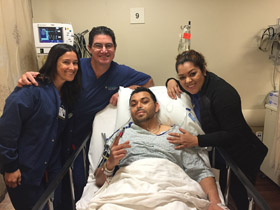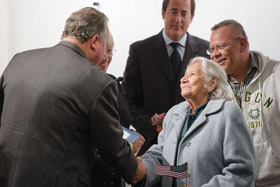Access for All
 For people who don’t have (or can’t get) health insurance, the price of a life- or career-saving surgery can be prohibitive.
For people who don’t have (or can’t get) health insurance, the price of a life- or career-saving surgery can be prohibitive.
“We’ve had patients come in here with conditions that should’ve been addressed much earlier, including one person who needed back surgery but held off until the end of the grape-picking season,” says Daniel Rabkin, program manager at Operation Access, a nonprofit organization that provides medical and surgical treatment to people who can’t afford treatments or can’t apply for health insurance often because they’re undocumented. “We’re talking about operations to save people’s livelihoods, and they’re too scared to go to a hospital to get treatment because they know they can’t afford it.”
Founded in 1993 in San Francisco by two surgeons and a hospital administrator, Operation Access now operates across the North Bay, with a bi-lingual staff of 13 and nearly 1,000 volunteers, ranging from doctors, surgeons, nurses and other medical professionals and administrators. Operation Access serves roughly 1,600 patients per year and fundraises an annual budget of $1.4 million, which it uses to organize the volunteers who set up clinics with its partner sponsors, which include Kaiser Permanente and Sutter, among others.
“The majority of our patients are restaurant workers, farmers and seasonal harvest workers,” says Rabkin. “These people make up the backbone of our nation’s infrastructure. They’re doing thankless jobs we need, and providing care for them is our only mission.”
Operation Access recently received its third All-Star Award from USA Today’s Make a Difference Day. “We’re so proud to be recognized for our work, but there’s always a need for more volunteers or more funds,” says Rabkin.
At Home in the World
Bill and Lindy Buchanan, owners of Parkpoint Health Clubs in Sonoma County, are firm believers in the value of community involvement, cultural interaction and travel. For the past 15 years, they’ve been active supporters of Habit for Humanity and its nongovernmental, worldwide efforts to provide decent housing for all peoples.
The Buchanans have personally traveled and worked with Habitat teams in Sri Lanka, Zambia and Nepal. They so strongly believe in the value of giving back and community involvement that they’ve also made the commitment to fund their employees’ participation in the organization; employees are able to choose the Habitat trip of their choice in any part of the world, and the Buchanans pay for the entire Habitat donation for their trip. Because of their support, Parkpoint employees have worked to build homes in countries such as Mozambique, New Zealand, Malawi, Honduras, Costa Rica, Thailand, Bali and Mongolia.
“Living briefly amidst a culture nothing like your own can be the most heartbreaking and beautiful chance to broaden your perspective of the world,” says Lauren Ahlgren, aquatics director at Parkpoint Club Healdsburg. “Bill and Lindy Buchanan graciously provided an opportunity to be a part of something bigger than ourselves. Their sponsorship, along with the projects Habitat for Humanity creates, encourages us by way of example to treat the world as a community.”
Napa’s New Citizens
 The One Napa Valley Initiative was started by the Napa Valley Community foundation in 2013 to help legal permanent Napa County residents become citizens. Terence Mulligan, president of NVCF, says, “Immigrants are a very important part of our community and our economy in Napa Valley. They contribute $1 billion per year to the county GDP and, although they’re only 23 percent of our population, they make up 33 percent of the overall workforce and 73 percent of the agricultural workforce.”
The One Napa Valley Initiative was started by the Napa Valley Community foundation in 2013 to help legal permanent Napa County residents become citizens. Terence Mulligan, president of NVCF, says, “Immigrants are a very important part of our community and our economy in Napa Valley. They contribute $1 billion per year to the county GDP and, although they’re only 23 percent of our population, they make up 33 percent of the overall workforce and 73 percent of the agricultural workforce.”
The response to this project, says Mulligan has been overwhelming. “There are 9,000 legal permanent residents [LPRs], or Green Card holders, who live in Napa County. In just over three years, 2,166 LPRs have received citizenship application assistance and related legal assistance, or enrolled in English as a second language and civics classes. We’ve served almost a quarter of the LPR population in a very short period of time.”
Citizenship is correlated with things like higher family income, increased English proficiency, more community involvement and better school outcomes for the children of those who naturalize. The initiative hopes to help 1,000 people who live or work in Napa County become United States citizens by 2018.
 The One Napa Valley Initiative was started by the Napa Valley Community foundation in 2013 to help legal permanent Napa County residents become citizens. Terence Mulligan, president of NVCF, says, “Immigrants are a very important part of our community and our economy in Napa Valley. They contribute $1 billion per year to the county GDP and, although they’re only 23 percent of our population, they make up 33 percent of the overall workforce and 73 percent of the agricultural workforce.”
The One Napa Valley Initiative was started by the Napa Valley Community foundation in 2013 to help legal permanent Napa County residents become citizens. Terence Mulligan, president of NVCF, says, “Immigrants are a very important part of our community and our economy in Napa Valley. They contribute $1 billion per year to the county GDP and, although they’re only 23 percent of our population, they make up 33 percent of the overall workforce and 73 percent of the agricultural workforce.”


